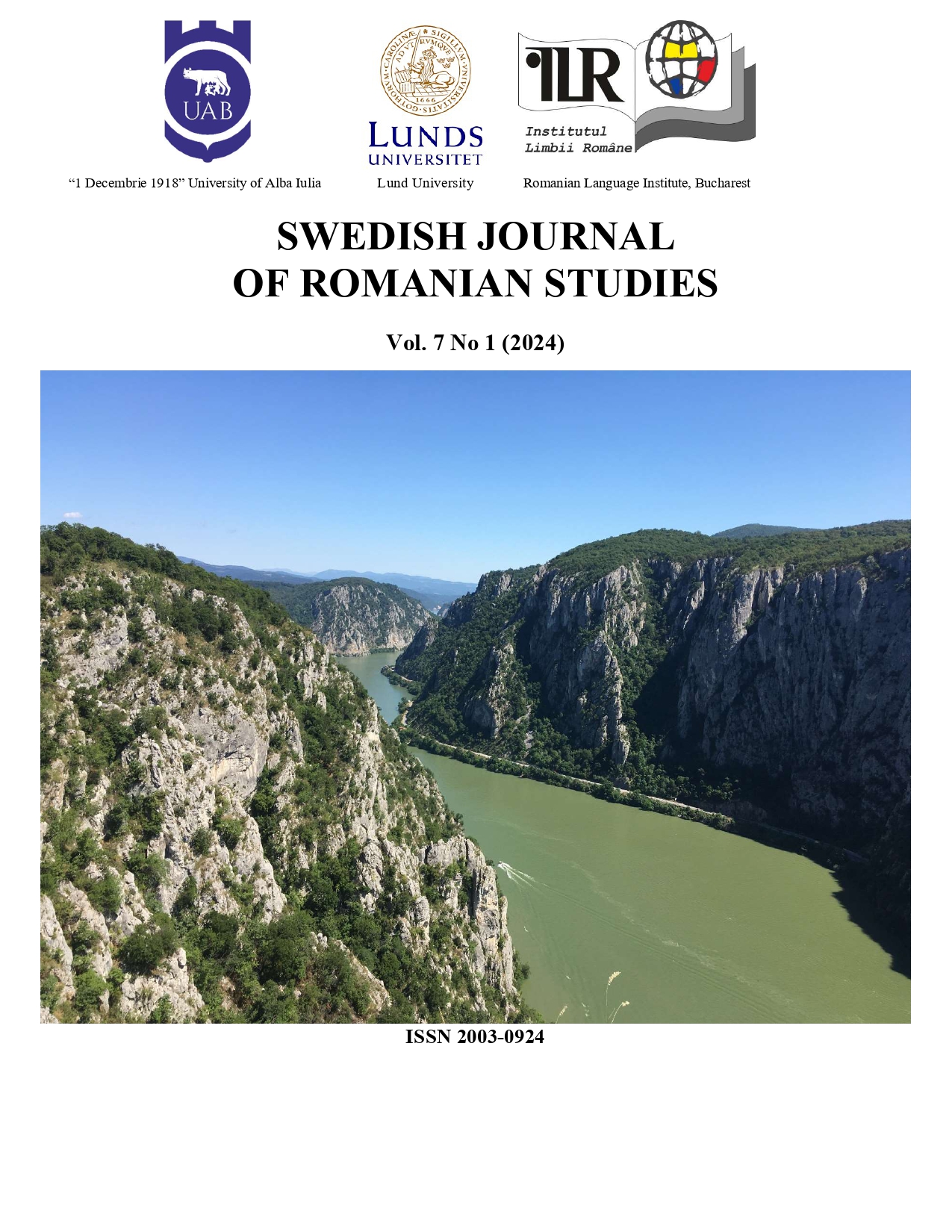Historiographic imaginary and hypotheses of heredity in the configuration of Romanian cultural identity
DOI:
https://doi.org/10.35824/sjrs.v7i1.25951Keywords:
identity, otherness, heredity mythmaking, Romanian historiography, imaginaryAbstract
This paper analyses the ways in which Romanian culture struggles to forge, at the level of historical and cultural discourse, an identity, a “personality”, and a specificity. It observes, within the process of forging its identity through a series of avatars, the discursive strategies through which specificity is revealed as an essential form of national uniqueness as well as the compensatory trends of identity fabrication. The paper also attempts to highlight the forms of historical and literary mystification through which, over time, Romanian culture responded to complexes related to its age, identity, belatedness, heredity, legitimacy, etc. Thus, the analysis reveals that, in essence, all the efforts, complexes and myths through which an identity was negotiated at the level of the histories of literature and Romanian historiographical texts betray, in fact, the same spectrum of the Identity-Otherness dialectic. Romanian culture, like other emerging cultures, was forced, first to survive and, later, in order to have a potential for prosperity, to define itself as a distinct entity by relating to the surrounding cultural reality, its growth and evolution taking place either under the sign of antagonism (i.e. a refusal of allogeneic import), or under that of synchronism (as permeabilization with regard to foreign influence), but, necessarily, as a reference to the Other. Moreover, the paper highlights, at the discursive level, the two main poles that have obsessively polarized the questions of descent and heredity within Romanian culture: its Roman and Dacian ancestries. The nuanced intentions underpinning the cultural need for international recognition by means of belonging as well as differentiation are discussed in the process.
References
Boia, L. (2011). Istorie și mit în conștiința românească [History and myth in Romanian consciousness] (6th ed.). București: Humanitas. (Original work published in 1997).
Călinescu, G. (1941). Istoria literaturii române de la origini până în prezent [The history of Romanian literature from its origins to the present] (1st ed.). București: Fundația Regală Pentru Literatură Și Artă.
Drăghicescu, D. (1907). Din psihologia poporului roman [From the psychology of the Romanian people]. București: Leon Alcalay.
Egri M., & Rustoiu A. (2020). Romanii [The Romans]. In S. Mitu (Ed.), Enciclopedia imaginariilor din România: Vol. 3. Imaginar istoric [The encyclopedia of Romanian imaginaries: Vol 3. Historical imaginary] (pp. 50-68). Iași: Polirom.
Florea, G. (2020). Dacii [The Dacians]. In S. Mitu (Ed.), Enciclopedia imaginariilor din România: Vol. 3. Imaginar istoric [The encyclopedia of Romanian imaginaries: Vol 3. Historical imaginary] (pp. 31-49). Iași: Polirom.
Giurescu, C. C. (1943). Istoria românilor din cele mai vechi timpuri până la moartea regelui Carol I [History of Romanians from the earliest times until the death of King Carol I] (3rd ed.). București: Cugetarea – Georgescu Delafras.
Martin, M. (2018). G. Călinescu și „complexele” literaturii române [G. Călinescu and the “complexes” of Romanian literature] (3rd ed.). București: ARC. (Original work published in 1981).
Neubauer, J. (2004). General Introduction. In J. Neubauer, & M. Corniș-Pope (Eds.), History of the Literary Cultures of East-Central Europe: Vol. 1. Junctures and Disjunctures in the 19th and 20th Centuries (pp. 1-18). Amsterdam/Philadelphia: John Benjamins Publishing Company.
Nicoară, S. (2020). Națiunea [The nation]. In S. Mitu (Ed.), Enciclopedia imaginariilor din România: Vol. 3. Imaginar istoric [The encyclopedia of Romanian imaginaries: Vol 3. Historical imaginary] (pp. 142-160). Iași: Polirom.
Rădulescu-Motru, C. (1999). Psihologia poporului român [The psychology of the Romanian people]. București: Paideia. (Original work published in 1937).
Renan, E. (1997). Qu’est-ce qu’une nation? [What is a nation ?]. Paris: Mille et une nuits. (Original work published in 1882).
Downloads
Published
How to Cite
Issue
Section
License
Copyright (c) 2024 Ioana Alexandra Lionte-Ivan

This work is licensed under a Creative Commons Attribution-NonCommercial 4.0 International License.
Authors who publish with this journal agree to the following terms:
a. Authors retain copyright and grant the journal right of first publication with the work simultaneously licensed under a Creative Commons Attribution-NonCommercial 4.0 International License that allows others to share the work with an acknowledgement of the work's authorship and initial publication in this journal.
b. Authors are able to enter into separate, additional contractual arrangements for the non-exclusive distribution of the journal's published version of the work (e.g., post it to an institutional repository or publish it in a book), with an acknowledgement of its initial publication in this journal.
c. Authors are permitted and encouraged to post their work online (e.g., in institutional repositories or on their website) prior to and during the submission process, as it can lead to productive exchanges, as well as earlier and greater citation of published work (See The Effect of Open Access).

